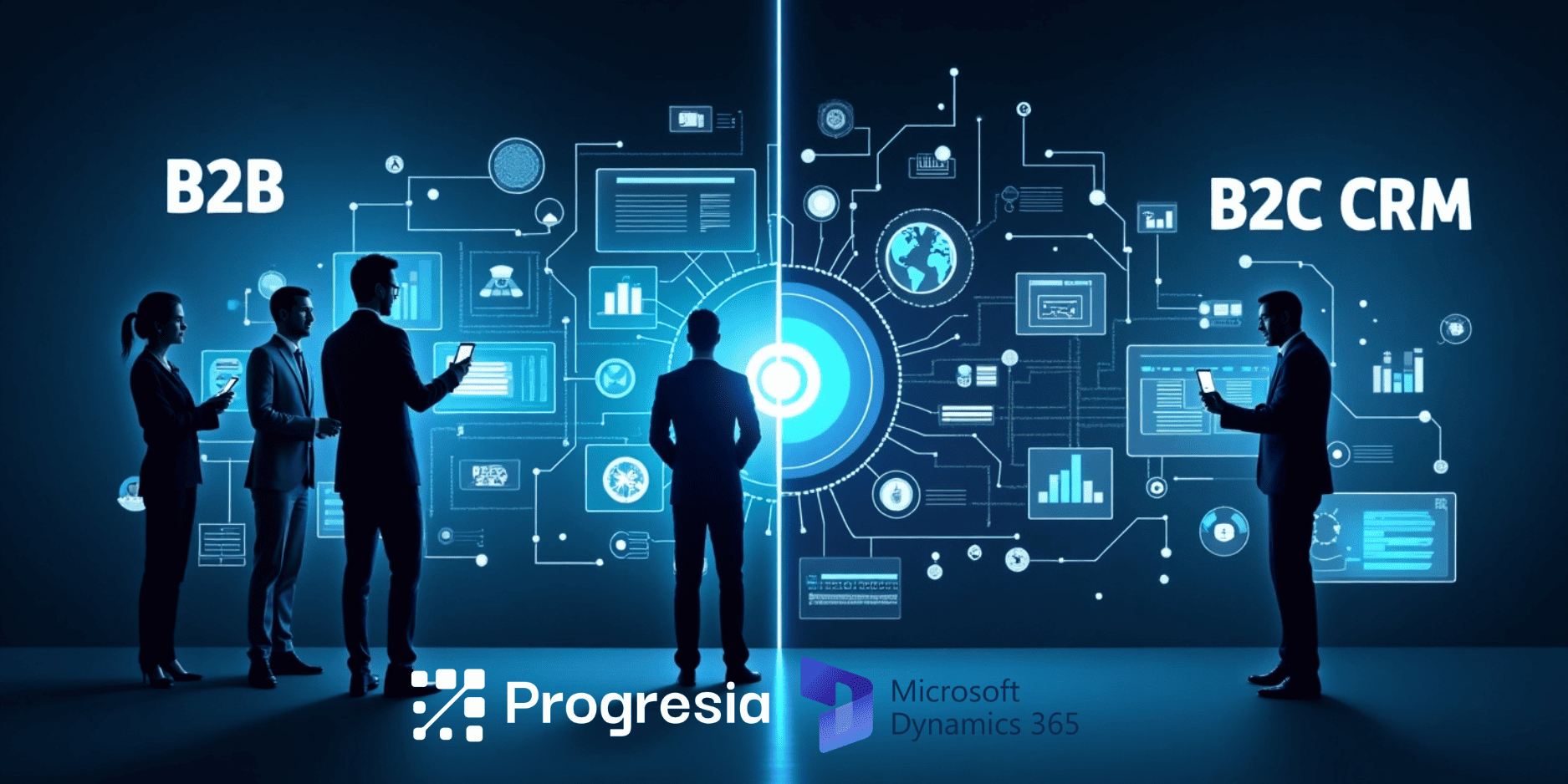CRM for B2B vs B2C
In today’s business environment, a CRM system is not just software for storing contacts. It is a comprehensive tool for managing customer relationships, covering sales automation, marketing, support, analytics, and much more. But when it comes to choosing a CRM, companies often face the question: CRM for B2B or CRM for B2C — is there a difference, what is it, and how to choose the best solution?
So, what distinguishes a B2B CRM from a B2C CRM? What are its key features and personalization options? How does a CRM help automate marketing and sales? And why should you consider Microsoft Dynamics 365 as one of the most optimal CRM platforms for companies?
Difference between B2B and B2C CRM
The main difference between B2B and B2C CRMs lies in the type of clients and the nature of the sales process.
- A B2B (Business-to-Business) CRM is designed for building long-term relationships with corporate clients. Here, the sales cycle can last weeks or even months. Multiple stakeholders may be involved, with complex approval chains and high-value deals — all of which require deep sales automation, detailed tracking of each deal stage, and coordinated teamwork.
- A B2C (Business-to-Consumer) CRM has a different focus — the mass market, a large volume of transactions, and quick customer decisions. The main goals here are personalization of the customer experience, audience segmentation, managing promotions and loyalty, and communication across various channels.
Key functional differences
| Feature | B2B CRM | B2C CRM |
|---|---|---|
| Client type | Company | Individual |
| Sales | Eewer deals with higher value | Many deals with lower value |
| Sales cycle | Long and complex | Fast and impulse-driven |
| Personalization | By business roles (e.g., CEO, marketer) | Individualized for each buyer |
| Communication | Email, meetings, calls, documentation | Social media, chatbots, SMS, email |
| Analytics | Deal stage tracking, sales funnel | Behavioral analytics, customer segments |
Microsoft Dynamics 365: A universal CRM for companies
Among modern CRM platforms, Microsoft Dynamics 365 stands out — a solution that integrates seamlessly with Power BI, ERP, Office 365, and offers modules for both B2B and B2C sectors.
According to Forrester, companies using Microsoft Dynamics 365 report:
- Up to 30% increase in sales team efficiency;
- Up to 25% higher lead-to-customer conversion;
- Up to 20% increase in customer satisfaction due to more precise personalization.
Dynamics 365 Sales — a B2B module
Dynamics 365 Sales is a tool for sales teams that enables transparent deal management, lead handling, automated customer interaction, and forecasting. Implementing Dynamics 365 in a B2B company can reduce the average sales cycle by up to 15% and increase communication efficiency by 20–25%.
Marketing automation in CRM
In the digital age, CRM-based marketing and sales automation is no longer a luxury but a necessity. According to Progresia, businesses that automate marketing with CRM report on average:
- 400% more qualified leads;
- Up to 34% growth in advertising campaign conversion;
- 20% lower marketing costs.
Analytics and personalization
CRM systems, including Microsoft Dynamics 365, offer modern analytics tools that show results and predict customer behavior. Integration with Power BI reduces report preparation time by up to 40%, while forecast accuracy increases by 30–35%.
CRM features for small business
Small businesses often lack the resources for full-scale CRM implementation, so they look for simple, lightweight, and effective solutions. According to TechJury, about 74% of small companies that adopted a CRM saw improved customer interactions within the first six months.
CRM for small businesses usually includes an intuitive interface, cloud-based deployment, easy integration with email and calendar, and basic analytics.
How to choose the right CRM system?
To choose a CRM system, consider:
- Who your client is — a company or an individual;
- How long your sales cycle lasts;
- Which processes need automation;
- Whether you need integration with ERP, email marketing, or BI tools;
- Your implementation and support budget.
B2B and B2C CRMs reflect two different approaches, each with its own logic, goals, and tools. However, they share the same core: the desire to better understand the customer, streamline operations, and grow the business.
Microsoft Dynamics 365 is one of the top platforms on the market, adaptable to any business model, offering powerful tools for analytics, personalized customer experiences, and sales automation.
In 2025, CRM is no longer a matter of choice — it's a matter of competitiveness. And companies that implement modern CRM solutions are the ones winning the customer race.

